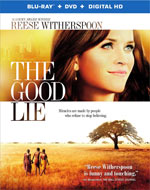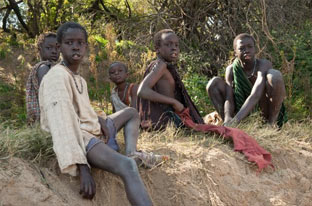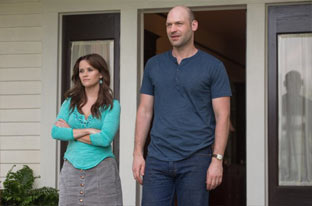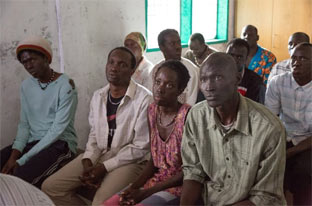

 - for thematic elements, some violence, brief strong language and drug use.
- for thematic elements, some violence, brief strong language and drug use.

They were known simply as "The Lost Boys." Orphaned by the brutal civil war in Sudan, which began in 1983, these young victims traveled as many as a thousand miles on foot in search of safety. Fifteen years later, a humanitarian effort would bring 3,600 lost boys, as well as girls, to America.
Mamere and Theo are sons of the Chief in their village in Southern Sudan. When an attack by the Northern militia destroys their home and kills their parents, eldest son Theo is forced to assume the role of Chief and lead a group of young survivors, including his sister Abital, away from harm. But the hostile, treacherous terrain has other dangers in store for them. As the tattered group makes the difficult trek to Kakuma refugee camp in Kenya, they meet other fleeing children, forging a bond with Jeremiah, who, at 13, is already a man of faith, and Paul, whose skills become essential to their survival.
Thirteen years later, the now young adults are given the opportunity to leave the camp and resettle in America. Upon arriving in Kansas, they are met by Carrie Davis (Witherspoon), an employment agency counselor who has been enlisted to help find them jobs-no easy task, when things like light switches and telephones are brand new to them.
Although Carrie has successfully kept herself from any emotional entanglements, these refugees, who desperately require help navigating the 21st century and rebuilding their shattered lives, need just that. So Carrie embarks on her own unchartered territory, enlisting the help of her boss, Jack (Corey Stoll).
(from Warner Bros. Home Entertainment)
When living in the States, it's easy to put out of our minds the conditions of other countries and cultures. In fact, it's all too easy to get fully wrapped up in our own little worlds where big problems to us are, in fact, miniscule in comparison to life-threatening problems of others around the world. For example, the war in Sudan forced people and children of all ages to walk -- oftentimes barefoot -- 1,000 miles to safety, only to have to stay in refugee camps where they were hardly free or under the best conditions (but it was sure better than being mercilessly slaughtered like many of their friends and family). Dubbed by many as "The Lost Boys," the majority of the survivors were young men and children who were robbed of their youth in order to survive. Many were turned into soldiers if they wanted to keep living as well.
Some of these refugees made it to the United States in 2000, before the events of 9/11 haulted the immigration process indefinitely. The film The Good Lie takes an intimate look into the lives of a small group of refugees -- from the time they survived their village being attacked on to their immigration to the United States when they tried to start a new life for themselves on foreign soil. Showing our country through the lives of these refugees -- the abundance of wealth, the jaded behavior, the dog-eat-dog nature of business and even the unnecessary waste and coldheartedness of the food industry -- gives a healthy vantage point through another perspective, ultimately questioning whether our system works as well as we believe it does.

From the opening of The Good Lie, when we meet the Sudanese children, unless you're well-versed on what the film's plot is ahead of time, you may wonder just what the aim of the movie is. But once we see a small "tribe" of kids who had survived a village attack head out on their journey to safety, you discover just how intense and sobering this story is. As you sit in the comfort of a movie theater or your living room, there's a sense of guilt that washes over you. (And it's a genuine guilt; the movie never feels manipulative.) But not only are you sitting in safety and "luxury," but you're also watching a storytelling of this that you most likely paid for. These kids had to drink their own urine to survive. It may churn your stomach to realize just how well we have it.
Although Reese Witherspoon's face is plastered all over the promotions for the movie, this is not her film. She doesn't even appear until 35 minutes into the movie, and even then she's just an employment agency worker who helps place the refugees in new work environments and then only pops up from time to time. Her character of Carrie Davis immediately is a harsh contrast to the refugees. She's jaded, bitter, unfriendly even, yet these men who have virtually nothing are kind and grateful. It really does make you wonder about us as a culture. But Witherspoon is fantastic in her role. It's a well-rounded one for sure as we see her change as the story progresses, allowing herself to be affected by these men. Also impacted by them is her boss, Jack, who at first finds them to be entirely odd but then takes a liking to them. But just as Mamere, Paul and Jeremiah impact the Americans, they themselves are impacted as well, with one of them succumbing to the temptation of drugs while working in a factory. He's soon addicted to pot and it changes his behavior, confusing his brothers.
While there is a scene involving Christmastime, the Blu-Ray/DVD's strategic release at two days before the holiday of Christmas (2014) is an interesting one. It'll definitely put things into a much greater perspective as we're looking forward to giving and receiving and spending time with our own family and friends. As family drama and financial strain increases at this time of year, The Good Lie is an interesting experience. And, again, a truly sobering one. Amazingly enough, too, is how the film never feels heavyhanded in its storytelling or message. The promotions also label this a faith-based film, but I'd hardly call it one. The faith of the Sudanese refugees is strong and inspiring, and it never feels forced or contrived. They're not preachy; their faith never seems like it's been scripted. And it never is a really centrical part of the plot. If anything, it's a good accent that increases the impact of the story. Their faith feels real because they've learned to rely on their belief in God and His promises to get them through some truly horrific conditions.

The content of the film probably isn't quite as rough as you might expect a movie about The Lost Boys to be. That isn't to say that it isn't intense at times, however. Much of the film's beginning has the kids running from gunfire and terrorists set out to kill them. We see a large group of people head up a riverside when the kids get a bad feeling about the route and decide to cross the river instead. We then see a growing number of dead bodies floating down the river, past the children, coming from the direction in which they almost travelled. Also, during their journey, they lose a few friends and family to sickness, starvation, or being captured. There's very little blood or gore shown in the movie, but there is plenty of heavy and real topics covered. There's also a surprising subplot where one of the refugees gets addicted to pot that's introduced to him by his coworkers. The only other main content to consider is a little bit of profanity, including a single use of the "S" word and a few uses of God's name in vain. The MPAA labeled the movie with "brief strong language," but I didn't catch any use of the "F" word, even though I was expecting to given that rating ("strong language" usually suggests the use of that word in the movie). There's a hint of sensuality when we first meet Carrie and she's sitting on the side of a bed getting dressed after having slept with a guy, but other than that, there's no nudity or anything explicit.
The Good Lie seems to hit all the right notes in telling a story based on true events without forcing an agenda or skimping on quality. Everything from the direction to the script, score and cinematography is really tight. The acting is also quite excellent. While the Sudanese characters are mostly played by unknowns--and the actors have a history as either child soldiers in Sudan or being related to Sudanese refugees--they, like the actors in Captain Phillips--are phenomenal talent who really strengthen this film. Some viewers might not be too keen on the portrayal of Americans or even the Christian organization/church that helps house the refugees (the representative, Pamela, willingly gets drunk with Carrie in one scene and remarks on having had too many kids), but for the most part, it's a thought-provoking and inspiring film that's still entertaining even though it's also relatively hard to watch at times (witnessing the hardships the children had to endure, and the fish-out-of-water circumstances they go through as adults in America). The Good Lie is surely a special experience.
- John DiBiase (reviewed: 12/22/14)
The Good Lie Journey (16:19) - The lone featurette talks about how the film came to be, the casting, and how it was inspired by real stories. We find out that they cast real refugees from Sudan (which is also revealed in the end credits of the film) and we see some exclusive footage from the actors' casting sessions (with some of them doing test scenes with Reese Witherspoon). It also includes some interviews that share their individual stories. The featurette also talks about the director, Philippe Falardeau, and his passion for the story and these people, and how they shot on-location in Africa for some scenes.
Deleted Scenes (15:05) - There's over 15 minutes of deleted or extended scenes, most of them being pretty short. The first scene is a brief one back in Sudan with the kids talking about the war. Next is Carrie getting on an elevator and accidentally leaving the 3 refugees standing outside of it (She uses the "S" word here once). The third scene shows the 3 refugees investigating the kitchen of their apartment and being confused by the foreign appliances and amenities. Next, Carrie is on the phone and mentions how out of place these guys are. The following one is Mamere in school asking about how he can take classes. Then we see Mamere diagnose a sick kid in the supermarket with chicken pox. Next is a short moment at Carrie's place where we see Abital setting up her room. And then there's a short moment where Mamere is being interviewed by a college board about his medical studies. There's then a deleted subplot with Mamere liking a girl named Jenny. We see her give him a gift for Christmas and he tries asking her out at the store. In the next scene, Mamere talks to Jack about leaving and his affection for Jenny and Jack tries to get Mamere to stay. We then see a brief clip of Mamere on the plane on the way to the refugee camp where he finds an envelope of money from Jack in his luggage. There's then a separate scene out of context where Mamere visits Carrie in the hospital recovering from an unnamed illness. They say she's fine but he diagnoses her with a fever. Next is a shot of Mamere visiting Daniel's grave. Then there's a two-part deleted subplot where he runs into the refugee camp doctor when he visits the camp infirmary. Lastly, he gets papers in Nairobi and goes to see the doc again about them and it ends after he hands the papers to him.
- John DiBiase, (reviewed: 12/23/14)
Disclaimer: All reviews are based solely on the opinions of the reviewer. Most reviews are rated on how the reviewer enjoyed the film overall, not exclusively on content. However, if the content really affects the reviewer's opinion and experience of the film, it will definitely affect the reviewer's overall rating.
 Sanctus Real Share Encouraging New Single, "Steady" Sanctus Real Share Encouraging New Single, "Steady"Sat, 14 Feb 2026 14:31:00 EST |
 B. Cooper Drops "L2ML (feat. Steve Means, Brandi Grimsley)" B. Cooper Drops "L2ML (feat. Steve Means, Brandi Grimsley)"Sat, 14 Feb 2026 14:20:00 EST |
 Pat Barrett Releases "Break Open" From Upcoming Live Album Pat Barrett Releases "Break Open" From Upcoming Live AlbumFri, 13 Feb 2026 19:14:00 EST |
 Trip Lee Debuts BRAG Worship EP, FOR YOUR GLORY Trip Lee Debuts BRAG Worship EP, FOR YOUR GLORYFri, 13 Feb 2026 18:55:00 EST |
 Passion Announces March 6th New Album, "Just That Good" Passion Announces March 6th New Album, "Just That Good"Fri, 13 Feb 2026 18:47:00 EST |
 KB Releases Genre-Bending New Single, "BLOOD 2" KB Releases Genre-Bending New Single, "BLOOD 2"Fri, 13 Feb 2026 18:42:00 EST |
 Les and Joyce Carlsen Declare "He's God" with New Rock Single Les and Joyce Carlsen Declare "He's God" with New Rock SingleFri, 13 Feb 2026 18:30:00 EST |
 Click here All News Headlines |
Click here All News Headlines |